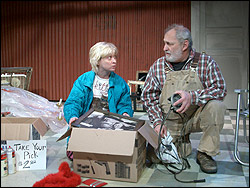God Damn Tom
Theater Schmeater; ends Sat., Feb. 26
The thing about God Damn Tom, both this production and the unseen guy of the title whose offstage mayhem fuels it, is that even the most infuriating of flaws don’t necessarily mean a person can’t be charming. Wayne Rawley’s sweet-and-sour script wasn’t perfect when presented as a staged reading during FringeACT in 2002, and it’s less sturdy now that director MJ Sieber’s rather shallow staging has baldly exposed its shortcomings. I don’t know that I can entirely recommend it, yet you might easily have a fine time in spite of everything.
With genuinely funny patter that melds a Marysville, Wash., drawl to everything from Mamet to Paddy Chayefsky’s Marty, Rawley’s play is a colloquial dip into the upset caused when the enigmatic Tom finally gets too drunk one night and finds himself accused of something worse than everything else he’s already done. What his alleged crime is we never hear, but we learn more about him from the eclectic posse of friends, family, and lovers he’s left in the wake of his temporary jail sentence. Put-upon wife Jillian (Alyssa Keene), having only recently survived a battle involving a hurled toaster, tells pal Shelly (Nicole Boote) that it may be best if Tom just rots where he is. Shelly is oddly defensive, but has bigger concerns about informing boyfriend Ned (Erik Hill), who’s a little slow-witted after his own violent tussle with Tom, that she’s pregnant. Meanwhile, Tom’s older brother Nason (John LoPresti) and decidedly salty sister-in-law Corkie (Teri Lazzara) have to pack up and hit the road because that bastard you-know-who has likely ratted out their shifty finances to the feds.
What Rawley does well here is get everyone swearing like a sailor without losing the affectionate or uncertain allegiances beneath their black clouds. The show’s best running gag involves Jesse (Rob West), who spends the entire play berating the titular troublemaker and courting his wife while maintaining, “Christ knows how much I love Tom!” Rawley’s detailed quirks, the same infectious minutiae that powered the nonsense of his Money & Run late-night serial for Schmeater, are happily on hand here, too—who else would stop to discuss the trap under a toaster that collects the crumbs?
Director Sieber, unfortunately, isn’t as smooth with the everyday eccentricities. He hasn’t textured the mostly two-person scenes with enough touches, glances, or effortlessly natural silences to convince us that everyone here has known this world, and each other, for quite some time. Rawley’s inflamed vernacular starts to ring false: A lot of the “fuck”s—and there are a lot of “fuck”s—sound superficially unruly without the ease or weight of routine to embrace them. The awkward blocking is full of folks crossing downstage in moments of duress while the others talk to their backs, an action that looks right at home on a soap opera or in some proscenium melodrama, but is fairly ridiculous in a small space peopled with characters supposedly comfortable enough to spew obscenities while folding laundry.
West, frustrated and lovestruck, comes off best in a cast a bit hampered by the subtext that Sieber just isn’t hitting. We rarely see how much these people might care for Tom until they tell us how they feel. Lazzara does foul-mouthed fairly well, and Hill makes a convincingly befuddled average joe, but everyone’s traumas look terribly overwrought and mundane when the milieu surrounding them isn’t grounded in stubborn veracity (though costumer Jennessa Richert gets extra points for Lazzara’s kitty sweatshirt and multicolored spandex tights). But you can still hear Rawley in there cracking wicked and wise, and, goddamit, that just might be enough for you. STEVE WIECKING
![]() An Enemy of the People
An Enemy of the People
Taproot Theatre; ends Sat., March 5
Henrik Ibsen caught a lot of crap for being such an obvious and tendentious playwright, and sure, no one but the thickest theatergoer could miss the point of Enemy—i.e., that the truth isn’t always popular. Yet it’s Ibsen’s very single-mindedness, his extremist vision, that has made this play such a timeless political allegory of the perils of righteousness. The idea of correctness confronting the forces of denial is pushed to its utmost limit, until all hell breaks loose. Arthur Miller’s adaptation, the one most folks go with these days, works brilliantly to remove some of Ibsen’s poorer tendencies, making the dialogue and action punchier and more immediate.
Director Scott Nolte gets the award for good timing on this one, and he smartly plays the whole shebang by simply allowing the production to exist without any subtextual nudging. So what we have is Ibsen’s small town, poised to become an international destination and cash cow by virtue of its healing spring waters. Dr. Stockmann (Terry Edward Moore), however, discovers that the water is poison, and in trying to raise the alarm, he comes up against resistance in the form of the town’s mayor—his brother, Peter (Marquam Krantz)—as well as an entire population whose motivations range from rabid mob instinct to simple greed, professional jealousy, ambition, blind patriotism, and everyday idiocy.
The only sure way to let such a familiar story resonate anew is to put on a solid show, and the always professional crew at Taproot is up to the task here. (The only shortfall to this production, in fact, is the stage itself, which is sparse and dull and too brightly lit—and what’s with those lavatory tiles on the wall?) The cast is uniformly excellent. Veteran Seattle actor Moore is perfectly cast as Dr. Stockmann, bringing to the role a poignant combination of bemusement, sorrow, and monomaniacal fury. As his glad-handing brother, Krantz ekes out the undercurrents of rivalry and envy that complicate the siblings’ relationship to the truth.
This is a solid, quick-moving, and engaging production of a play that has, once again, gained a heightened relevance. RICHARD MORIN




